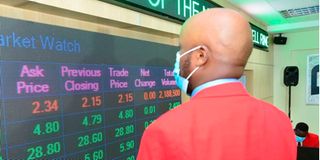Investing or gambling? Day trading comes to NSE

Securities trader Mbuthia Irungu at Nairobi Securities Exchange (NSE) trading floor on August 26, 2020.
What you need to know:
- In mature markets, innovators have come up with apps that make it easy for investors to buy and sale stocks on their mobile phones.
- Day trading has had its challenges around the world having been associated with scams and betting like tendencies in mature markets.
From next month, Kenyans will have a chance to buy and sell shares on the same day on the Nairobi Securities Exchange (NSE), opening up the bourse to gamblers.
Day trading is the practice of purchasing and selling a security within a single day or trading session or multiple times over the course of the day.
From November 22, Nairobi will be catching up with the top stock markets in the world that allow for day trading, which has become popular among the youth, who are investing in the stock market for the first time.
In mature markets, innovators have come up with apps that make it easy for investors to buy and sale stocks on their mobile phones.
The intraday trade was initially planned to start in September 2015 but that has dragged due to system upgrades and linkages by the NSE and Central Depository and Settlement Corporation (CDSC).
Windfall or huge losses
But this week, the Capital Markets Authority (CMA) gave the NSE its approval to initiate day trading as part of a strategy to enhance market liquidity.
In preparation, the NSE said it has commissioned a new trading system that enables separation of the trading and post-trading activities.
“The separation effectively enables the introduction of new products including covered short selling and day trading, which will revolutionise the capital markets and strengthen NSE’s position as the preferred investment hub in the region.”
Day trading has been likened to sports and casino betting where one walks in and gets out the same day with a windfall or counting their losses.
After the lockdown, young people, who had never invested in the stock market before jumped on day trading, which became one of the biggest drivers of stock markets in the developed world.
Though day trading has its own risks, it has the potential of opening up the stock market to a flood of short-term investors who want to ‘get-rich-quick’ and lack the patience to wait for a long time for the stock to appreciate significantly or to earn dividends in the company.
As risky as gambling
Day trading has had its challenges around the world having been associated with scams and betting like tendencies in mature markets, including China and the US. It also has a higher risk of encouraging insider trading, which has destroyed the reputation of many stock markets.
Also, what investors are not told is that day trading is just as risky as gambling given that more people lose money than those that end up making it on the bourse.
NSE CEO Geoffrey Odundo said day trading is a welcome move for local investors who have previously lobbied for the activation of the intraday trading.
“Day trading will allow investors to trade on one position, two or three times per day. This will significantly increase our turnovers and attract more investors to the bourse,” NSE chairman Kiprono Kittony said.
Experts say that unlike day trading which has investors with a short-term view, investing is putting money into the stock market with a long term view, or as long as ‘an investor’s entire life.’





